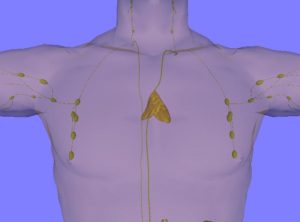
It turns out that a body part considered unimportant, and that frequently gets removed during operations - is actually important for adult health. This body part is the thymus. The thymus is frequently (routinely) removed during heart surgery for easier access to the heart and major blood vessels.
The thymus is an organ of the immune system within which T cells mature. For years the medical community regarded the thymus as only important before birth and during childhood, but "nonfunctional" in adults. A recent large study found that this view is wrong - that even in adults the thymus is important for immune and overall health.
Massachusetts General Hospital researchers found that after 5 years a higher risk of death from any cause (all cause mortality), cancer, and even autoimmune diseases among those who had thymus removal (thymectomy) versus those who had similar heart (cardiothoracic) surgery without thymus removal.
In other words, we need all our body parts! Even if the medical community doesn't quite understand (at this time) why we have them.
Excerpts from Medical Xpress: Study reveals unexpected importance of the thymus in adults
The thymus gland—which produces immune T cells before birth and during childhood— is often regarded as nonfunctional in adults, and it's sometimes removed during cardiac surgery for easier access to the heart and major blood vessels.
New research led by investigators at Massachusetts General Hospital (MGH) and published in the New England Journal of Medicine has uncovered evidence that the thymus is in fact critical for adult health generally and for preventing cancer and perhaps autoimmune disease.
To determine whether the thymus provides health benefits to adults, the team evaluated the risk of death, cancer, and autoimmune disease among 1,146 adults who had their thymus removed during surgery and among 1,146 demographically matched patients who underwent similar cardiothoracic surgery without thymectomy. The scientists also measured T cell production and blood levels of immune-related molecules in a subgroup of patients.
Five years after surgery, 8.1% of patients who had a thymectomy died compared with 2.8% of those who did not have their thymus removed, equating to a 2.9-times higher risk of death. Also during that time, 7.4% of patients in the thymectomy group developed cancer compared with 3.7% of patients in the control group, for a 2.0-times higher risk.
In an additional analysis involving all patients in the thymectomy group with more than five years of follow-up, the overall mortality rate was higher in the thymectomy group than in the general U.S. population (9.0% vs. 5.2%), as was mortality due to cancer (2.3% vs. 1.5%).
After excluding these individuals, 12.3% of patients in the thymectomy group developed autoimmune disease compared with 7.9% in the control group, for a 1.5-times higher risk.
In the subgroup of patients in whom T cell production and immune-related molecules were measured (22 in the thymectomy group and 19 in the control group, with an average follow-up of 14.2 postoperative years), those who had undergone thymectomy had consistently lower production of new T cells than controls and higher levels of pro-inflammatory molecules in the blood.
